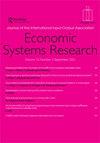通过混合MRIO乘数加速器模型实现脱碳的经济和环境影响
IF 1.6
4区 经济学
Q2 ECONOMICS
引用次数: 6
摘要
摘要本文分析了三个能源密集型部门/机构(发电、道路运输和家庭消费)的脱碳对四个经济和环境变量(增加值、就业、能源消耗和排放)的影响。在我们的基本设想中,欧盟应该在30年内完成选定部门的脱碳,而在世界其他地区,这些部门将实现30%的脱碳。我们假设,一旦可再生能源取代化石燃料,排放量和就业率就会下降。然而,与此同时,需要大量投资来建设所需的基础设施。为了计算全部影响,我们将乘数加速器模型应用于从EXIOBASE3导出的全局多区域混合输入-输出表。在欧盟,这种脱碳每年分别减少22%、19%和4%的能源消耗、二氧化碳排放和就业。因此,有必要采取额外措施来避免全球变暖和吸收失业。本文章由计算机程序翻译,如有差异,请以英文原文为准。
Economic and environmental impacts of decarbonisation through a hybrid MRIO multiplier-accelerator model
ABSTRACT This paper analyses the impacts of decarbonisation in three energy-intensive sectors/institutions (electricity generation, road transport, and household consumption) on four economic and environmental variables (value added, employment, energy consumption, and emissions). In our basic scenario, the EU is supposed to complete the decarbonisation of the selected sectors in 30 years, whereas in the rest of the world these sectors will be 30% decarbonised. We hypothesise that emissions and employment will fall once renewable sources of energy replace fossil fuels. Yet, in the meanwhile, massive investments are needed to build the required infrastructure. To compute the full impact, we apply a multiplier-accelerator model to a global multiregional hybrid input–output table derived from EXIOBASE3. In the EU, such a decarbonisation reduces yearly energy consumption, CO2 emissions, and employment by 22%, 19%, and 4%, respectively. Thus, additional measures are necessary to avoid global warming and absorb unemployment.
求助全文
通过发布文献求助,成功后即可免费获取论文全文。
去求助
来源期刊

Economic Systems Research
ECONOMICS-
CiteScore
5.60
自引率
4.00%
发文量
17
期刊介绍:
Economic Systems Research is a double blind peer-reviewed scientific journal dedicated to the furtherance of theoretical and factual knowledge about economic systems, structures and processes, and their change through time and space, at the subnational, national and international level. The journal contains sensible, matter-of-fact tools and data for modelling, policy analysis, planning and decision making in large economic environments. It promotes understanding in economic thinking and between theoretical schools of East and West, North and South.
 求助内容:
求助内容: 应助结果提醒方式:
应助结果提醒方式:


